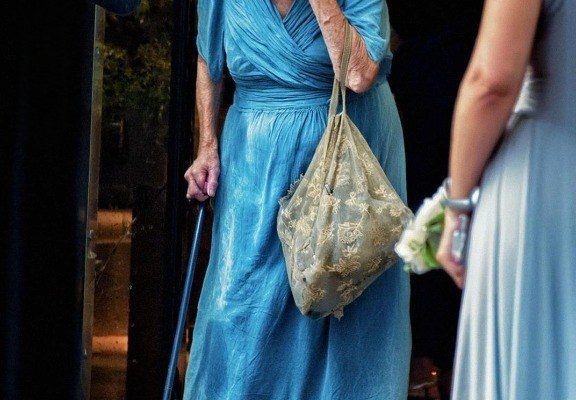Rachel thought her wedding day would be a flawless showcase of the life she had built: the luxury venue, the glamorous guests, and every detail designed to impress. But one moment shattered that illusion—when she turned away the very woman who had given her everything growing up. Days later, in grief, she finally opened her grandmother’s gift: a worn bag of walnuts that held a truth she wasn’t prepared for.
Rachel had grown up more in her grandmother Jen’s cottage than in her parents’ home. With her mother and father working long hours, it was Grandma who raised her. That little house—with its creaky floorboards and lavender scent—was her safe place. The kitchen always smelled of simple, hearty meals, and every evening Grandma would hand her walnuts, already cracked so Rachel wouldn’t get her hands dirty.
“Eat these, sweetheart,” she’d whisper. “They’ll make your heart stronger.”
Rachel had been born with a heart defect, surviving years of surgeries and treatments. Her scar never mattered to Grandma Jen—she saw her granddaughter as strong, whole, and worthy of love.
But as Rachel grew older, the values her parents lived by—status, wealth, appearances—slowly became her own. She began to see Grandma’s world as small, outdated, even embarrassing. She visited less, scrolled on her phone while Grandma tried to talk, and once cruelly complained about the “old people smell” of lavender that used to soothe her as a child.
Still, Grandma never stopped calling. She reminded Rachel to take her medicine, told her she loved her, and always ended with: “Be kind, sweetheart. The world is already too cruel.”
When Rachel got engaged to Grant, a man from a wealthy family, the wedding became a spectacle—hundreds of guests, designer gowns, celebrity catering. Rachel initially didn’t want her grandmother there, certain she wouldn’t fit in, but at her mother’s insistence, she agreed.
On the day itself, amid gowns and tuxedos, Grandma Jen arrived in a faded blue dress and mismatched shoes, carrying a ragged cloth bag. She pressed it into Rachel’s hands.
“My Rachel,” she said softly. “Open this soon. It’s my gift—there’s a surprise inside.”
Rachel peeked in and saw walnuts. Just walnuts. Dusty, cracked, ordinary walnuts.
Her face burned with humiliation. “Are you serious? You brought me walnuts? To my wedding?”
“They’re special,” Grandma whispered, her eyes shining.
But Rachel snapped. “It’s just a dirty bag. You’re embarrassing me. Leave.”
And she did—quietly, with her head bowed.
Days later, Grandma called to remind Rachel about the gift. Rachel brushed her off, saying she’d get to it. When her grandmother called again, Rachel’s irritation spilled out: “Stop bothering me about stupid walnuts.”
That was the last conversation they ever had.
Two months later, the call came: her grandmother was gone, taken by heart failure. At the funeral, Rachel broke down—her memories of cracked walnuts, lavender-scented rooms, and gentle hands overwhelming her.
That night, unable to bear the guilt, she dug out the old bag. Trembling, she cracked one walnut open. Inside was a tiny folded note: “Be kind, Rachel. The world can be cruel, but don’t let it change you.”
In another walnut was a $20 bill. Another held a message: “Save, Rachel. Save for your future.”
Each shell she cracked revealed something hidden—money her grandmother had quietly tucked away, and little handwritten reminders of the lessons she had tried to pass down. It wasn’t just a bag of walnuts. It was a time capsule of love, sacrifice, and guidance.
Through tears, Rachel opened the last walnut. Inside was a note: “We all make mistakes, my sweet girl. You deserve forgiveness. It’s never too late to choose love.”
Rachel collapsed in sobs, clutching the note to her chest.
Her grandmother hadn’t left her money or walnuts. She had left her wisdom, her patience, her final lesson.
Weeks later, Rachel stood in her own kitchen, peeling potatoes and frying sausages in the quiet dawn. For the first time in years, she made the simple meals her grandmother used to cook. No luxury, no pretense—just food, love, and gratitude.
As she whispered a thank-you to her grandmother’s memory, Rachel finally understood: wealth doesn’t lie in appearances. Love hides in the smallest gestures—in cracked walnuts, in handwritten notes, in the steady presence of someone who never gave up on you.
She couldn’t undo the past. But she could live out her grandmother’s last wish—to be kind, no matter how cruel the world became.



